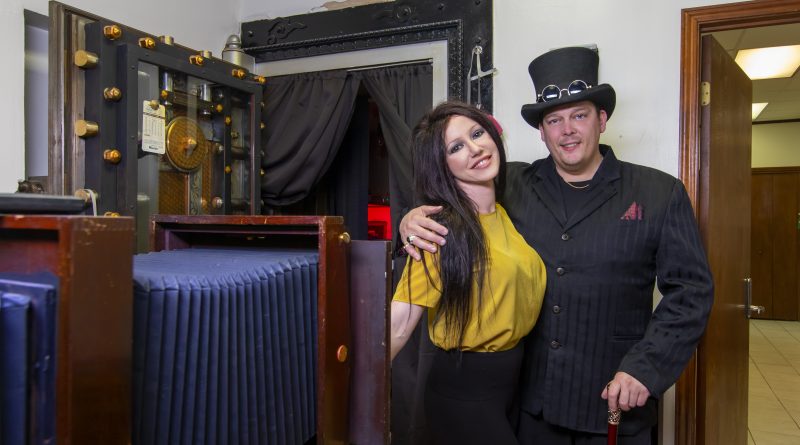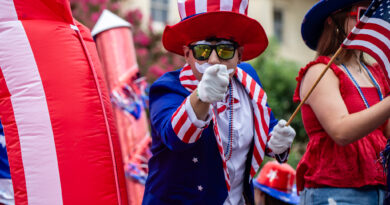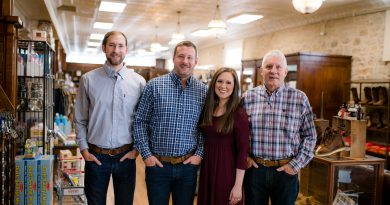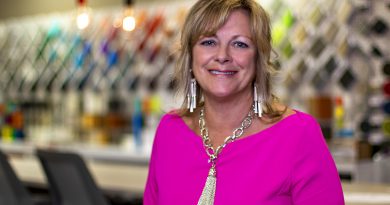Past meets present with style & heart at Forgotten Film
By Elizabeth Finkenbinder | Photos by Skeebo and Janna Zepp
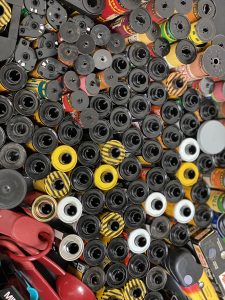 The old First National Bank in downtown Belton on Central Avenue houses a bit of a virtual time machine capable of taking you as far back as the middle of the 19th century. Forgotten Film, a photography studio owned and operated by a delightfully friendly and fascinating couple, Jonathan and Laura Lee Cobb, restores old photos, shoots portraits using late 19th and early 20th century image reproduction technology, and allows customers to be creative far beyond the selfie with a modern smartphone.
The old First National Bank in downtown Belton on Central Avenue houses a bit of a virtual time machine capable of taking you as far back as the middle of the 19th century. Forgotten Film, a photography studio owned and operated by a delightfully friendly and fascinating couple, Jonathan and Laura Lee Cobb, restores old photos, shoots portraits using late 19th and early 20th century image reproduction technology, and allows customers to be creative far beyond the selfie with a modern smartphone.
The Cobbs originally hail from Rhode Island. Jonathan was in the U.S. Army and was stationed at Fort Hood when they fell in love with Central Texas. They both agreed that the friendly attitudes of Texans and the warmer weather motivated them to make the move permanent a few years later. Although they have family in the Northeast and love to visit, they have put down roots in Belton.
Forgotten Film opened its doors in November. The couple loves vintage photography, which includes taking pictures with old cameras, developing film in a dark room and doing without the digital advantages of editing with computer software or apps.
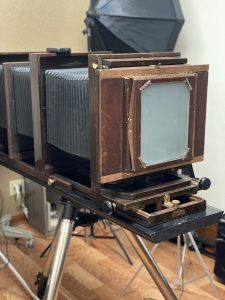
Their eyes lit up when discussing the film development process, which can be messy and difficult. Jonathan spoke of his deployments overseas while in the military and the post-traumatic stress disorder that resulted from that time. It was suggested to him that a creative hobby might help his healing process. He was trying to quit smoking, and photography kept his hands busy. He had always been interested in photography, but it wasn’t until he got his first DSLR (digital single-lens reflex) camera that he began to pursue it enthusiastically.
Laura Lee said they were privileged to be a part of a photography class given by the Warrior Connection in Vermont, which is an organization that helps soldiers and vets with their various needs, including psychological and physical ones. Jonathan particularly enjoyed film photography, and he actually started a dark room in a closet of his house, learning the process on his own, step by step.
When the Cobbs first moved to Texas, they briefly had an online business selling stock photography, but they began extending their skills to photo restoration and camera repair, even vintage models. They began going to flea markets, pawn shops, and antique stores to find old cameras and were surprised to find canisters and containers of old film in cameras that people had forgotten to develop. Many rolls included pictures of very old ships, army scenes, and nature shots.
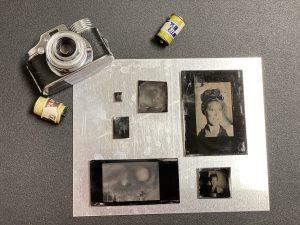
They were excited to help a woman retrieve tin-type film from a camera that had been stuck for years, and she was finally able to see a picture of a relative not seen in generations. That kind of moment makes their business so much sweeter because they get to see the joy on people’s faces when they discover lost treasures.
When given a tour of the shop, it is fun to see vintage cameras and film abound. An Agfa box camera, probably dating back to the 1890s, sits in the back of the store. It is the kind of camera from a century ago with a pull string, an 8×10 wet plate for development, and a black cloth to cover the photographer’s head. The puff of magnesium released when capturing an image made everything brighter and would distract the photographer’s eyes with bright lights and affect the process unless the photographer’s head was covered. The tables are piled with film, disposable cameras, and other odds and ends.
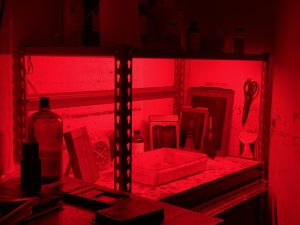
vintage-style photos get developed.
At the back of this fascinating place is the dark room where Jonathan processes the film. A secured vault sits in the corner that has not been opened in decades. There is no running water in the room for film development, so he has to improvise with a jug and a tube to aid in the film developing process.
Both Jonathan and Laura Lee emphasized more than once how much they love what they do for a living. The old-fashioned, creative process of film development brings them tremendous joy as does interacting with the people they see in the shop. By fixing cameras and restoring old pictures to their former glory, they uncover hidden treasures for families and rekindle memories thought to be long buried.
And they love creating new “old photos” for customers. People are welcome to wear modern street clothes or bring costumes if they choose. Laura Lee hopes to someday have a supply of costumes available for patrons to the shop.
For those who would love to take part in this classic photography experience at Forgotten Film, sessions can be booked over the phone at 254-661-4803 or online at https://forgottenfilm.us/. They can be found on Facebook at Forgotten Film or
@forgottenfilmusa on Instagram.

